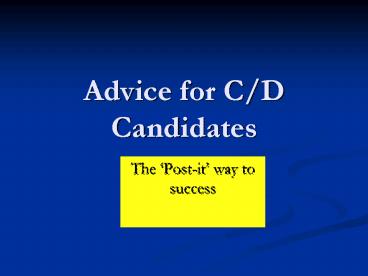Advice for CD Candidates - PowerPoint PPT Presentation
1 / 14
Title:
Advice for CD Candidates
Description:
You need to be able to give EXAMPLES for all these types and functions. Muscles (1) ... Trachea, Bronchi, Brochioles, Alveoli. Alveoli ... – PowerPoint PPT presentation
Number of Views:34
Avg rating:3.0/5.0
Title: Advice for CD Candidates
1
Advice for C/D Candidates
- The Post-it way to success
2
The Skeleton Joints
Function of the skeleton Shape
Support Movement Protection Blood production
- What you need to know
Types of Movement FlexionExtensionRotationAbduc
tionAdduction
Types of Joints Ball SocketHingeGlidingPivot
You need to be able to give EXAMPLES for all
these types and functions
3
Muscles (1)
How muscles work Muscles can only pull, not
pushWork in ANTAGONISTIC pairs
- What you need to know
Types of Muscle Involuntary Cardiac Voluntary/Skel
etal
Types of Fibre Fast Twitch (anaerobic) Slow
Twitch (aerobic)
Muscles you need to know Deltoids, Trapezius,
PectoralsGluteals, Abdominals, Biceps
Quadriceps, Hamstrings, Triceps, Gastrocnemius,
Latissimus Dorsi.
You need to be able to give EXAMPLES of how each
of these work
4
Muscles (2)
- What you need to know
Effects of regular trainingEndurance training-
ST muscle fibres use energy more efficiently
dont bulk upPower training FT fibres increase
in size (Hypertrophy)No training causes muscle
wastage (Atrophy)
Tendons Connect muscle to bone When the muscle
contracts it pulls the tendon which pulls the
bone
You need to be able to give EXAMPLES of how each
of these work
5
Circulatory System - Heart, Blood Blood Vessels
- What you need to know
The Heart P24The parts of the HeartStroke
Volume, Heart Rate Cardiac Output - Cardiac
Output SV x HR
Effects of regular training P24 Stronger Heart
Muscles-Cardiac HypertrophyIncreased Stroke
VolumeIncreased Cardiac Output during
exerciseLower resting heart rate (Bradycardia)
Function of bloodTransport ProtectionRegulation
Blood VesselsArteries, Veins, Capillaries P23
Components of BloodRed Blood Cells (Transport
O2)White Blood Cells (Fight Infection)Platelets
(Helps blood clot)Plasma (Mostly water to allow
blood to flow carries food hormones)
You need to be able to give EXAMPLES of how each
of these work
6
Respiratory System Lungs P26/27
The parts of the lungsTrachea, Bronchi,
Brochioles, Alveoli
- What you need to know
Gaseous ExchangeO2 goes from Alveoli to blood in
the capillaries.CO2 goes from the blood in the
capillaries into the alveoli
AlveoliLarge surface area, very thin to allow
gas to exchange with the blood in the capillaries.
Benefits of Regular exerciseVital capacity
increasesTidal Volume increasesIncreased O2
Debt tolerance
You need to be able to give EXAMPLES of how each
of these work
7
Aerobic/Anaerobic Activity P30/31
- What you need to know
Aerobic With OxygenEndurance events low
intensityWaste products CO2 Water can be
breathed out. Waste products do not build up in
the body to reduce performance Slow twitch muscle
fibres
Anaerobic Without OxygenExplosive events-
Speed Power- High intensityLactic acid builds
up and reduces the effectiveness of the
performance. Fast Twitch muscle fibres
TrainingAerobic Longer low intensity
trainingi.e. Weight training low weight high
repsAnaerobc Short high intensity
trainingi.e. Weight training High weight low
reps
You need to be able to give EXAMPLES of how each
of these work
8
Skill P32-40
Skill--- Learn Definition P32 You learn skill
(Learned abilities) You perform it
efficiently You can eventually perform it
consistently
- What you need to know
FeedbackIntrinsicExtrinsicKnowledge of
PerformanceKnowledge of Results
TypesOpen Changing environmentClosed same
environment
Novice InconsistentNeeds to put in a lot of
energyCant perform the skill quickly or
efficientlyCant adapt the skill to different
situations
Expert ConsistentSeems to need little effort or
energyPerforms the skill quickly and
efficientlyAdapt the skill to different
situations
9
Skill P32-40
Learning skills Whole learning Part Learning
- What you need to know
Ways of learning DemonstrationCopyingPracticeTr
ial errorRole Model
Information processing Input- all the
sensesDecision making- what to doOutput
performing the actionFeedback how well it was
done.
You need to be able to give EXAMPLES of how each
of these work
10
Ability P36-37
- What you need to know
Abilities are innateYou are born with your
abilities
Natural AbilitiesAgilityBalanceCo-ordinationSp
eedFlexibilityReaction Time
You need to be able to give EXAMPLES of how each
of these can be applied to sporting situations
Remember if you are asked to give an examle
from an activity those doing the GAMES GCSE can
only give examples from a Game. Those doing PE
can give any example but read the question
carefully
11
Motivation Mental preparation P44-49
Mental Preparation RelaxationMental
RehearsalFocusing
- What you need to know
MotivationIntrinsic- desire to compete for own
personal reasons fun enjoyment, fitness, self
satisfacton etc. ExtrinsicCompeting for
external rewards money, cups etc
Goal Setting - SMARTER S SpecificM MeasurableA
AcceptedR RealisticT Time RelatedE ExcitingR
Recorded
Arousal The state of readiness for a
competitionOver ArousalPerformance may decline
if the performer becomes too motivated
Types of Goal Process GoalsTarget Goals
12
Social Reasons for Participation P50-53
- What you need to know
Increased Leisure Time Shorter Working
WeekTechnologyEarly RetirementUnemployment
Why People ParticipateHealthLeisure-Especially
developing or making friendshipsVocation - Jobs
13
School P54-57
- What you need to know
Schools are Promoters of Physical
ActivityNational CurriculumExamination
CoursesExtra Curricular ActivitiesLinks with
Local Sports Clubs
Schools Help Students.Learn Skills, Learn about
healthy lifestyles, Take different roles- coach,
captain ref etc. Learn about issues in
sport Experience activities that they may
continue after they leave school
14
Social Background P58-67
- What you need to know
Things that influence participationAccessAgeDis
abilityEducationEnvironmentFamilyGenderMedia
Peer GroupsPoliticsPovertyReligionSponsorship
Tradition
You need to be able to give EXAMPLES of how each
of these effect participation































